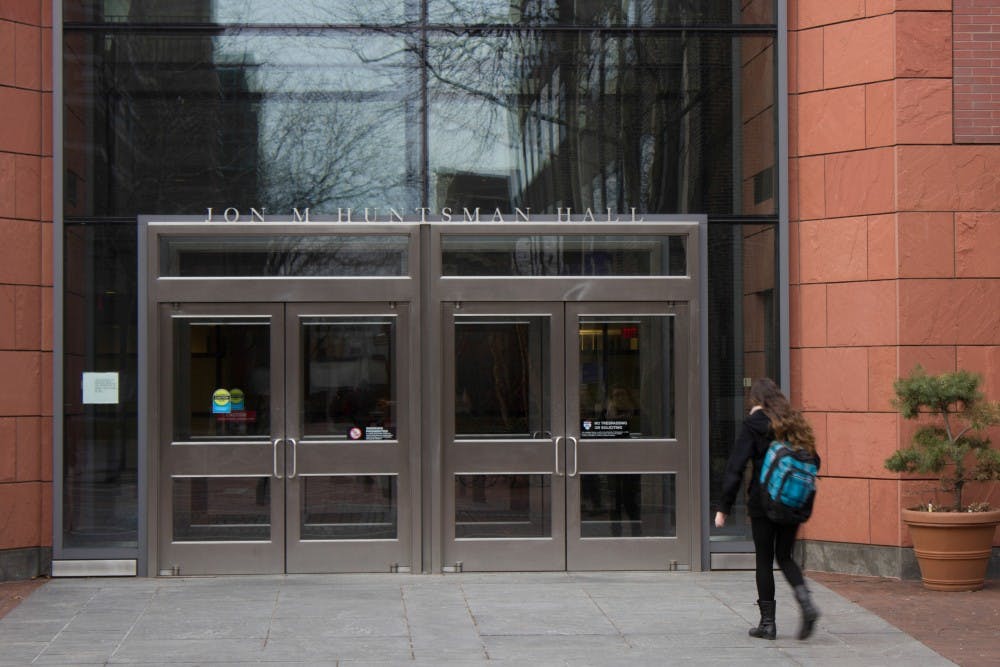
Recent increases in students entering the workforce after graduation may be attributed to the current strong economy or the increased prevalence of OCR.
Credit: Guyrandy Jean-GIllesAlthough employers have steadily increased educational requirements for hires, the majority of Penn students still join the workforce immediately after finishing their undergraduate studies.
A recent survey by Chicago-based job search engine CareerBuilder showed that in the last five years more and more job positions have increased education qualifications required of applicants. However, the percentage of Penn students pursuing higher education immediately after undergraduate studies hasn’t increased to match that trend, and the majority of students go on to full-time employment right after obtaining a bachelor’s degree.
The survey, which was based on more than 2,300 employers in the private sector, found that 37 percent of companies say they hire college graduates for positions that in the past were primarily held by people with only high school degrees, and 26 percent say they hire people with master’s degrees for jobs that used to go to candidates with bachelor’s degrees.
In an email statement from Career Services, Senior Associate Director Barbara Hewitt said more Penn undergraduate students are opting to enter the workforce immediately after graduation because of the strong state of the current economy.
In a recent Career Services survey, more than 64 percent of the Class of 2015 was employed either full-time or part-time and full-time students surveyed earned an average salary of $68,152. 13.1 percent of the Class of 2015 is either continuing education or seeking to continue education, compared to 14.6 percent in 2014, 17.5 percent in 2013 and 19 percent in 2012.
“There’s no doubt that it’s an advanced-degree holder’s market out there,” said Dennis Yim, the director of pre-business and pre-graduate programs for Kaplan Test Prep. “Specifically for MBAs, job placements are up, compensation packages are up and business schools have been doing some serious innovating over the past few years, integrating into their curriculum courses to teach such high in demand skills like coding and data science.”
Yim noticed the trend of an increase in MBA holders in the tech industry, which he said could be due to the increasing versatility of the degree and higher value placed on this type of education in prospective employees.
According to Joanne Munekawa, a career services manager at the resume writing and career services agency Employment BOOST, the increasing number of students with bachelor’s degrees means that employers can expect that and more of their applicants.
She said that even if a degree above a bachelor’s may not be necessary to perform a job effectively per se, companies can use these higher educational standards to fish out candidates who have a strong work ethic, better punctuality and higher upward mobility. She also said that employers particularly like higher degrees when they are accompanied by work experience because then employees will be able to leverage some of their experiences during their casework.
Career Services said that a majority of Penn alumni do go on to pursue higher education later on in life. In the most recent out-of-undergraduate alumni reports, 63 percent of respondents indicated that they were enrolled in or completed an advanced degree program after five years, and 73 percent indicated they had done so within 10 years of graduation.
The increase in students joining the workforce could also be attributed to the increased prevalence of on-campus recruiting. Nearly 42 percent of the Class of 2015 was employed through OCR or a previous OCR employer.
Still, some companies don’t seem to be noticing the trend of increased educational qualifications.
Steven Rothberg of College Recruiter said that although this may be true in a limited number of sectors, employers in some fields are reducing qualifications because they find that there’s little correlation between quality of work and degree obtained.
“As more employers discover that to be true, so will more employment attorneys and anti-discrimination government agencies and those groups will put pressure on employers to stop requiring degrees unless the data shows that those degrees are relevant to job performance,” Rothberg said.
The Daily Pennsylvanian is an independent, student-run newspaper. Please consider making a donation to support the coverage that shapes the University. Your generosity ensures a future of strong journalism at Penn.
DonatePlease note All comments are eligible for publication in The Daily Pennsylvanian.








